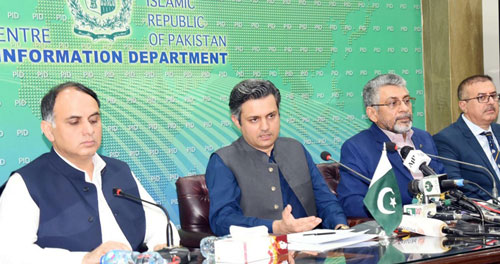Pakistan given 7-point
new action plan: Hammad
Mohammad Arshad Islamabad
The Financial Action Task Force has decided to keep Pakistan on its grey list and asked Pakistan to work to address strategically important anti-money laundering counter terror financing deficiencies.
Sources privy to the development told Pakistan Observer that FATF made this decision public after five-day plenary meeting in Brussels.
The source said that FATF noted that since June 2018, when Pakistan made a high-level political commitment to work with the FATF and APG to strengthen its AML/CFT regime and to address its strategic counter terrorist financing-related deficiencies, Pakistan’s continued political commitment has led to significant progress across a comprehensive CFT action plan.
The FATF recognizes Pakistan’s progress and efforts to address these CFT action plan items and notes that since February 2021, Pakistan has made progress to complete two of the three remaining action items on demonstrating that effective, proportionate and dissuasive sanctions are imposed for TF convictions and that Pakistan’s targeted financial sanctions regime was being used effectively to targeted terrorist assets.
Pakistan has now completed 26 of the 27 action items in its 2018 action plan. The FATF encourages Pakistan to continue to make progress to address as soon as possible the one remaining CFT-related item by demonstrating that TF investigations and prosecutions target senior leaders and commanders of UN designated terrorist groups.
In response to additional deficiencies later identified in Pakistan’s 2019 APG Mutual Evaluation Report, Pakistan has made progress to address a number of the recommended actions in the MER and provided further high-level commitment in June 2021 to address these strategic deficiencies pursuant to a new action plan that primarily focuses on combating money laundering.
FATF recommends that Pakistan must enhance international cooperation by amending the MLA law; demonstrate that assistance is being sought from foreign countries in implementing UNSCR 1373 designations and demonstrate that supervisors are conducting both on-site and off-site supervision commensurate with specific risks associated with DNFBPs, including applying appropriate sanctions where necessary.
Meanwhile, Federal Minister Hammad Azhar said on Friday that Pakistan has been given the sternest action plan by the Financial Action Task Force while the FATF president has praised the performance of Islamabad regarding its implementation.
Hammad Azhar made the statement while addressing a media briefing regarding the FATF’s decision for retaining Pakistan on its grey list.
He clarified that Pakistan is not facing any danger to fall on FATF’s blacklist as the debate was made on the country’s placement on the whitelist. Pakistan will not face any sanctions after being retained in the grey list, he added.
Azhar said that FATF has given a new seven-point action plan to Pakistan and it is important to implement the previous and new action plan for getting out of the grey list.
Islamabad has successfully completed the implementation of 26 out of 27 points of the previous action plan which primarily focused on counter-terrorism.
The federal minister said that FATF President Dr Marcus Pleyer has admitted that the Pakistani government has made substantial progress in making its counter-terrorist financing systems stronger and more effective.
Azhar continued that FATF decided to retain Pakistan on its grey list besides granting two years for implementing the new action plan.
The country had complied with the 75 out of 82 points given by FATF in 2018 including 31 out of 40 recommendations made by the International Co-operation Review Group, whereas, the new action plan is focused on anti-money laundering.
The latest action containing points for anti-money laundering and counter-terrorism is easier as compared to the previous one and the government will take less time to implement it, said Azhar.
Azhar said that the federal government will try to implement the new action plan within 12 months instead of two years. He added that the government had passed 17 bills to curb money laundering and terror financing.










